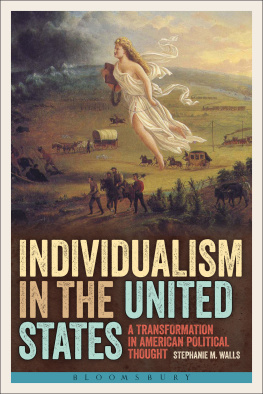Individualism and Collectivism
New Directions in Social Psychology
Richard E. Nisbett, Series Editor
Social psychology is moving in new directions as the root questions of culture, group structure, communication, collective representations, and societal conflict are being answered in innovative ways. The new social psychology not only employs the conceptual and methodological tools of social cognition but in asking broader questions often draws on sociology, political science, history, philosophy, and anthropology. By using this interdisciplinary approach, social psychologists are mapping out ways to understand the role groups play in influencing individual minds. New Directions in Social Psychology brings the best of this work together in an effort to shape and advance these emerging trends.
Individualism and Collectivism,Harry C. Triandis
Justice, Liability, and Blame: Community Views and the Criminal Law,Paul H. Robinson and John M. Darley
FORTHCOMING
Culture and Interpersonal Morality,Joan Miller
Cultures of Honor: The Psycho-Economic Roots of Violence,Richard E. Nisbett and Dov Cohen
Social Psychology and Law,Gene Borgida and Tom Tyler
Cultural Psychology of African Americans,James M. Jones
New Directions in Social Psychology
First published 1995 by Westview Press
Published 2018 by Routledge
711 Third Avenue, New York, NY 10017, USA
2 Park Square, Milton Park, Abingdon, Oxon OX14 4RN
Routledge is an imprint of the Taylor & Francis Group, an informa business
Copyright 1995 Taylor & Francis
All rights reserved. No part of this book may be reprinted or reproduced or utilised in any form or by any electronic, mechanical, or other means, now known or hereafter invented, including photocopying and recording, or in any information storage or retrieval system, without permission in writing from the publishers.
Notice:
Product or corporate names may be trademarks or registered trademarks, and are used only for identification and explanation without intent to infringe.
Library of Congress Cataloging-in-Publication Data
Triandis, Harry Charalambos, 1926-
Individualism and collectivism / Harry C. Triandis.
p. cm. (New directions in social psychology)
Includes bibliographical references and index.
ISBN 0-8133-1849-1 ISBN 0-8133-1850-5 (pbk.)
1. Individualism. 2. Collectivism. I. Title. II. Series
HM136.T75 1995
302.54dc20
94-46567
CIP
ISBN 13: 978-0-8133-1850-9 (pbk)
I was raised in greece, at a time when it was a traditional, collectivist culture. I came to North America to complete my undergraduate studies and did my Ph.D. at Cornell University. North America, north of the Rio Grande, contains largely individualist cultures. I have been fascinated by the two kinds of cultures and wrote about their differences early in my career (Triandis, 1972). Between 1980 and 1994 I did a good deal of empirical work exploring these constructs. Here I summarize this work, and I explore the rich literature produced by others that deals with this contrast.
Tendencies toward individualism and collectivism exist within every individual and in every society. Most people start by being collectivists, attached to their families. They become detached from them in different degrees and learn to be detached from collectives in different situations.
In collectivist cultures this detachment is minimal; people think of themselves as parts of their collectives and in most situations subordinate their personal goals to those of their collectives. Peoples social behavior is a consequence of norms, duties, and obligations. They do not give up relationships unless the relationship becomes extraordinarily costly. Such cultures are most stable. There is little change in social relationships. People do not leave their collectives; they live and die within them. When they get married, they link with another collective, and personal emotions are much less important than obligations and duties, so divorce is also rare. Children are brought up to be good members of the collective.
In individualistic cultures people are more detached from their collectives. They feel autonomous, and their social behavior maximizes enjoyment and depends on interpersonal contracts. If the goals of the collective do not match their personal goals, they think it is obvious that their personal goals have precedence. If the costs of relationships are greater than their enjoyments, they drop the relationships. They change relationships often, and when they get married, they do it on the basis of personal emotions, which often change over time, and thus divorce is frequent. They raise their children to be independent of their collectives. Freedom from the influence of the collective is a very important value.
Within any culture there are people who act more like collectivists or like individualists. The distributions of these attributes, however, are different.
In collectivist cultures people act like collectivists in most situations in which they are dealing with an ingroup, but they act like individualists, maximizing their benefits and outcomes, in most situations where they deal with outgroups. The switching of relationships from ingroup to outgroup and back to ingroup occurs with some regularity, and even kin can be placed in the position of being outgroup members if property or other important resources are to be divided. Thus, the maintenance of good relationships requires constant attention and the exchange of favors, gifts, and other resources. The important point is that people deal with each other not as individuals but as members of collectives, according to the roles they have in these groups, and put much effort into maintaining close relationships.
In individualist cultures people deal with each other as individuals and pay little attention to the group memberships of others. However, there are conventional ways of making group memberships salient. For example, race, religion, politics, or belief systems can function to create ingroups and outgroups, and then people in individualistic cultures act like collectivists. That makes social behavior complicated, which is why understanding the difference between individualism and collectivism is important.
This book was written to help the reader understand how the individualistic and collectivist patterns operate. They operate both across cultures and within any society and, in fact, within each human. There is a constant struggle between the collectivist and individualist elements within each human. It is useful to think of culture as a tool kit that contains elements that are individualistic or collectivist, which define a situation as interpersonal or intergroup. People sample elements from this tool kit to construct the meaning of situations, which determines their behavior. In cultures where most relationships are seen as interpersonal, we have individualism; in cultures where most situations are defined as intergroup, we have collectivism.
These definitions have important implications for political, social, religious, and economic life. They influence the way we perceive reality, and our philosophic views interact with these definitions, so we see the world through different lenses. In this book we will explore how the world looks through the two kinds of lenses.











